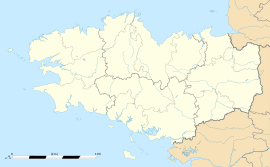Ploudalmézeau
Ploudalmézeau
Gwitalmeze | |
|---|---|
 A view of the sea, at Portsall | |
| Coordinates: 48°32′28″N 4°39′22″W / 48.5411°N 4.6561°W | |
| Country | France |
| Region | Brittany |
| Department | Finistère |
| Arrondissement | Brest |
| Canton | Plabennec |
| Intercommunality | Pays d'Iroise |
| Government | |
| • Mayor (2020–2026) | Marguerite Lamour[1] |
| Area 1 | 23.18 km2 (8.95 sq mi) |
| Population (2021)[2] | 6,358 |
| • Density | 270/km2 (710/sq mi) |
| Time zone | UTC+01:00 (CET) |
| • Summer (DST) | UTC+02:00 (CEST) |
| INSEE/Postal code | 29178 /29830 |
| Elevation | 0–86 m (0–282 ft) |
| 1 French Land Register data, which excludes lakes, ponds, glaciers > 1 km2 (0.386 sq mi or 247 acres) and river estuaries. | |
Ploudalmézeau (French pronunciation: [pludalmezo]; Breton: Gwitalmeze) is a commune in the Finistère department of Brittany in north-western France.
The village and port of Portsall is part of the commune. The Amoco Cadiz oil tanker ran aground off Portsall in 1978, causing a large crude oil spill.
Geography
[edit]Climate
[edit]Ploudalmézeau has an oceanic climate (Köppen climate classification Cfb). The average annual temperature in Ploudalmézeau is 11.9 °C (53.4 °F). The average annual rainfall is 1,006.4 mm (39.62 in) with November as the wettest month. The temperatures are highest on average in August, at around 17.0 °C (62.6 °F), and lowest in January, at around 7.7 °C (45.9 °F). The highest temperature ever recorded in Ploudalmézeau was 38.7 °C (101.7 °F) on 18 July 2022; the coldest temperature ever recorded was −7.0 °C (19.4 °F) on 28 February 2018.
| Climate data for Ploudalmézeau (1981–2010 averages, extremes 1998−present) | |||||||||||||
|---|---|---|---|---|---|---|---|---|---|---|---|---|---|
| Month | Jan | Feb | Mar | Apr | May | Jun | Jul | Aug | Sep | Oct | Nov | Dec | Year |
| Record high °C (°F) | 17.0 (62.6) |
20.8 (69.4) |
24.1 (75.4) |
26.8 (80.2) |
28.2 (82.8) |
30.5 (86.9) |
38.7 (101.7) |
32.2 (90.0) |
31.6 (88.9) |
28.1 (82.6) |
21.4 (70.5) |
17.1 (62.8) |
38.7 (101.7) |
| Mean daily maximum °C (°F) | 9.9 (49.8) |
10.3 (50.5) |
11.8 (53.2) |
13.3 (55.9) |
15.9 (60.6) |
18.6 (65.5) |
20.1 (68.2) |
20.5 (68.9) |
19.2 (66.6) |
16.2 (61.2) |
12.6 (54.7) |
10.2 (50.4) |
14.9 (58.8) |
| Daily mean °C (°F) | 7.7 (45.9) |
7.8 (46.0) |
8.9 (48.0) |
10.1 (50.2) |
12.8 (55.0) |
15.1 (59.2) |
16.7 (62.1) |
17.0 (62.6) |
15.6 (60.1) |
13.3 (55.9) |
10.3 (50.5) |
7.8 (46.0) |
11.9 (53.4) |
| Mean daily minimum °C (°F) | 5.5 (41.9) |
5.2 (41.4) |
6.0 (42.8) |
7.0 (44.6) |
9.6 (49.3) |
11.7 (53.1) |
13.3 (55.9) |
13.5 (56.3) |
12.0 (53.6) |
10.3 (50.5) |
8.0 (46.4) |
5.4 (41.7) |
9.0 (48.2) |
| Record low °C (°F) | −5.0 (23.0) |
−7.0 (19.4) |
−2.2 (28.0) |
−0.7 (30.7) |
1.6 (34.9) |
4.3 (39.7) |
6.5 (43.7) |
3.7 (38.7) |
3.5 (38.3) |
−0.3 (31.5) |
−2.4 (27.7) |
−4.4 (24.1) |
−7.0 (19.4) |
| Average precipitation mm (inches) | 112.1 (4.41) |
82.1 (3.23) |
74.4 (2.93) |
86.7 (3.41) |
65.5 (2.58) |
48.4 (1.91) |
72.4 (2.85) |
59.6 (2.35) |
61.3 (2.41) |
105.7 (4.16) |
121.0 (4.76) |
117.2 (4.61) |
1,006.4 (39.62) |
| Average precipitation days (≥ 1.0 mm) | 15.8 | 13.1 | 12.9 | 13.3 | 10.5 | 8.5 | 11.4 | 9.1 | 9.2 | 15.5 | 17.0 | 17.5 | 153.6 |
| Source: Meteociel[3] | |||||||||||||
International relations
[edit]Ploudalmézeau is twinned with Cullompton, Devon.
Population
[edit]
|
| ||||||||||||||||||||||||||||||||||||||||||||||||||||||||||||||||||||||||||||||||||||||||||||||||||||||||||||||||||
| Source: EHESS[4] and INSEE (1968-2017)[5] | |||||||||||||||||||||||||||||||||||||||||||||||||||||||||||||||||||||||||||||||||||||||||||||||||||||||||||||||||||
Breton language
[edit]In 2008, 11.69% of primary-school children attended bilingual schools, where Breton language is taught alongside French.[6]
Amoco Cadiz oil spill
[edit]
On 16 March 1978, Amoco Cadiz, a very large crude carrier (VLCC), owned by Amoco, split in three after running aground on Portsall Rocks, 5 km (3.1 mi) from the coast of Portsall, resulting in the largest oil spill of its kind in history to that date.[7]
See also
[edit]References
[edit]- ^ "Répertoire national des élus: les maires". data.gouv.fr, Plateforme ouverte des données publiques françaises (in French). 2 December 2020.
- ^ "Populations légales 2021" (in French). The National Institute of Statistics and Economic Studies. 28 December 2023.
- ^ "Normales et records pour Ploudalmezeau (29)". Meteociel. Retrieved 9 June 2022.
- ^ Des villages de Cassini aux communes d'aujourd'hui: Commune data sheet Ploudalmézeau, EHESS (in French).
- ^ Population en historique depuis 1968, INSEE
- ^ Ofis ar Brezhoneg: Enseignement bilingue (in French)
- ^ Auke Visser (26 August 2010). "Amoco Cadiz". International Super Tankers. Archived from the original on 4 March 2012. Retrieved 9 September 2010.
External links
[edit]- Official website
- Base Mérimée: Search for heritage in the commune, Ministère français de la Culture. (in French)
- Mayors of Finistère Association (in French)




